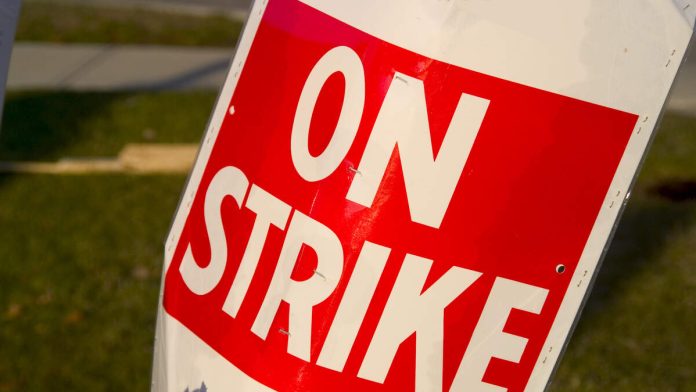LOS ANGELES (CNS) – A five-day strike in California and Hawaii by thousands of unionized Kaiser Permanente registered nurses and other health professionals continued for a third day Thursday amid contract negotiations, but Kaiser officials said affected facilities will remain open with some adjustments.
Workers represented by the United Nurses Associations of California/Union of Health Care Professionals began picketing at 7 a.m. Tuesday at locations across the region.
Participating workers include registered nurses, pharmacists, nurse anesthetists, nurse practitioners, midwives, physician assistants, rehab therapists, speech language pathologists, dietitians and other specialty health- care professionals, according to the union.
“Our colleagues are leaving for better working conditions and pay — an average increase in pay of about 25 percent,” said Jeff Cathcart, a certified registered nurse anesthetist working at Kaiser South San Francisco. Cathcart is also a member of his local bargaining team, where he has witnessed firsthand delays and denials from Kaiser management. “When we can’t retain and recruit enough staff, that leads to access issues for our patients. And that’s what we’re out here fighting for.”
Union officials said they do not take the decision to walk off the job lightly, but claim Kaiser “has not agreed to a contract that delivers on the core priorities of the frontline health care professionals who make Kaiser work every day.”
Cathcart said that at a recent negotiating session that lasted until 2 a.m., management walked away from the table despite what the 20-year Kaiser employee called “proposals to improve patient care.”
“We gave management every opportunity to engage in meaningful dialogue and work toward fair solutions, but they chose to walk away.”
Kaiser officials insisted in a statement the company is committed to reaching a labor agreement.
“We respect the Alliance and value their members — our employees — for the vital role they play caring for our 12.5 million members,” according to Kaiser. “We’ve worked to reach new national and local agreements — achieving 52 tentative agreements, holding over 900 local bargaining sessions, and reaching comprehensive agreements at 17 of 54 local tables. We’ve enhanced proposals, initiated mediation, and extended bargaining. Even after receiving 10-day strike notices, we continued negotiating, seeking agreement.”
The company added: “At the heart of this negotiation is a dispute about wages. We recognize our employees’ hard work and have offered a strong contract proposal that pays off immediately and over the long term. Alliance- represented employees currently earn, on average, 16% more than peers elsewhere. Our offer increases their already above-market wages over the four- year contract, and enhances their high-value medical plans and retiree benefits, benefits that have long made Kaiser Permanente an employer of choice.”
The company said hospitals and medical offices will remain open during the strike, and will shift appointments to virtual care via phone, video and e-chat. In some cases, some health appointments, elective surgeries and procedures will be rescheduled.
Kaiser emphasized that facilities will be staffed by physicians, experienced managers and trained staff with added licensed contract professionals as needed. Additionally, the company said it will be onboarding up to 7,600 nurses, clinicians and other staff to work during the strike — individuals who have worked for them before.
More than 1,000 Kaiser employees have also volunteered to be reassigned to work in strike locations, the company said.
Members can find the updates on care impacts at kp.org. Kaiser expects normal operations to resume after 7 a.m. Sunday.
“We remain committed to bargaining in good faith for a fair agreement that balances fair pay with high-quality, affordable care,” Kaiser said in a statement. “We will continue providing the care our members rely on while honoring employees and protecting patients.”
According to Kaiser, the company has been working with the Alliance to support nearly 61,000 employees.
The Alliance initially sought a 38% wage increase over four years, but now seeks 25%, which Kaiser Permanente described as a figure “out of step with today’s economic realities and rising health care costs,” according to the company.
Such a wage hike would increase the company’s $6.3 billion annual payroll and may lead to higher rates for members and customers, with serious market implications, officials said.
“Our 21.5% offer will increase payroll for this group by nearly $2 billion in total by 2029,” Kaiser said in a statement. “Anything beyond 21.5% will require us to further increase rates for our members and customers at a time when health care costs are increasingly unaffordable and many are having to make the difficult choice to go without coverage. We have a responsibility to the right thing for our employees and our members and customers.”
Meanwhile, the union argued that Kaiser has the ability to pay — saying that, in 2021, the company’s reserves stood at $44 billion. In 2024, Kaiser reached $66 billion in reserves, an increase of $22 billion, the union said.
“This is not a money problem. It’s a priority problem,” according to a statement from the Alliance.
The union said its request for an increase of 25% was, in part, to address an 18.5% inflation increase.
“We’re not asking for special treatment — we’re asking for equal treatment. Our proposal of a 25% wage increase over four years is designed to restore what was lost, keep pace with the cost of living and recognize the value of our members’ labor,” the Alliance said in a statement.

Recent Comments